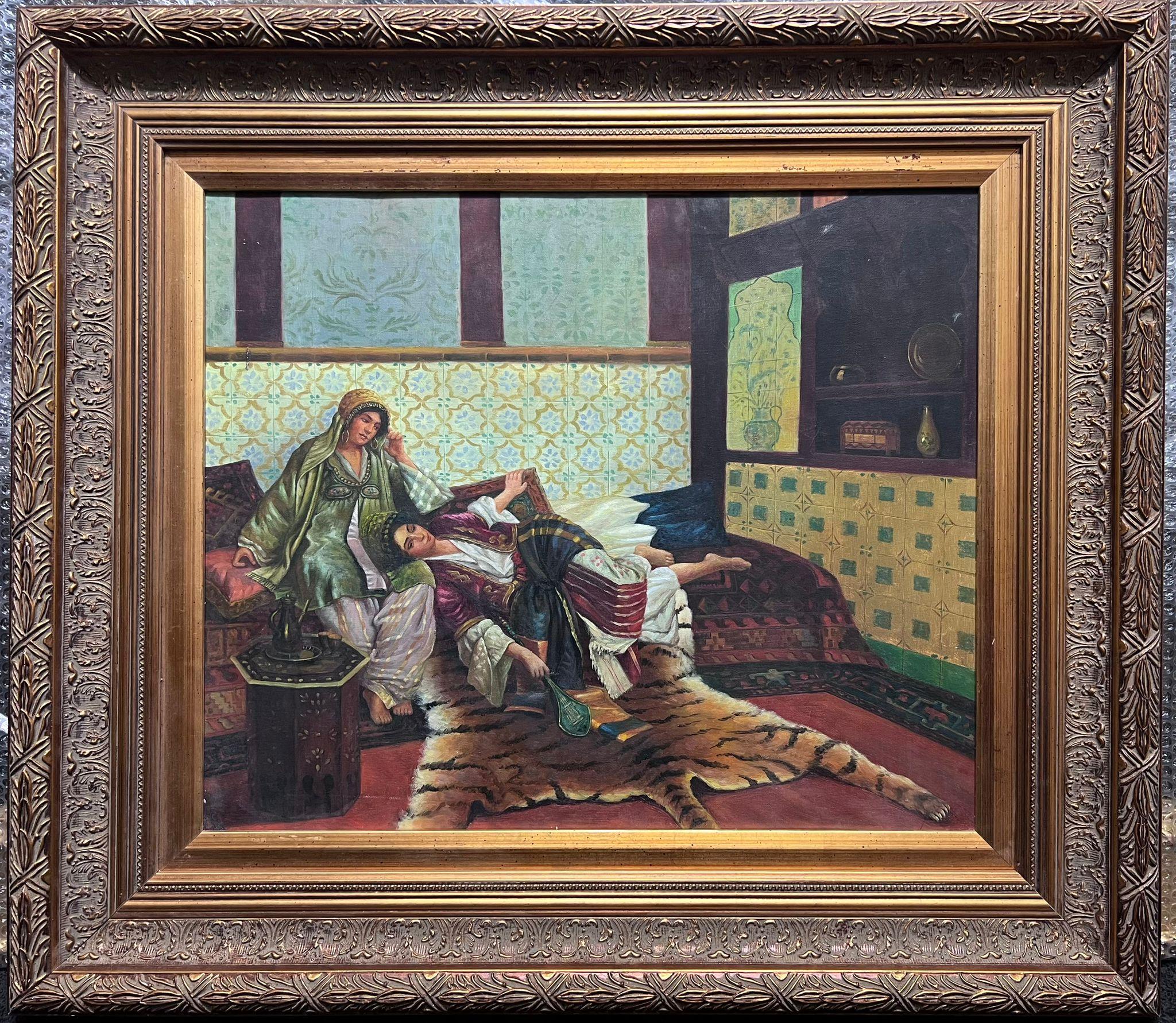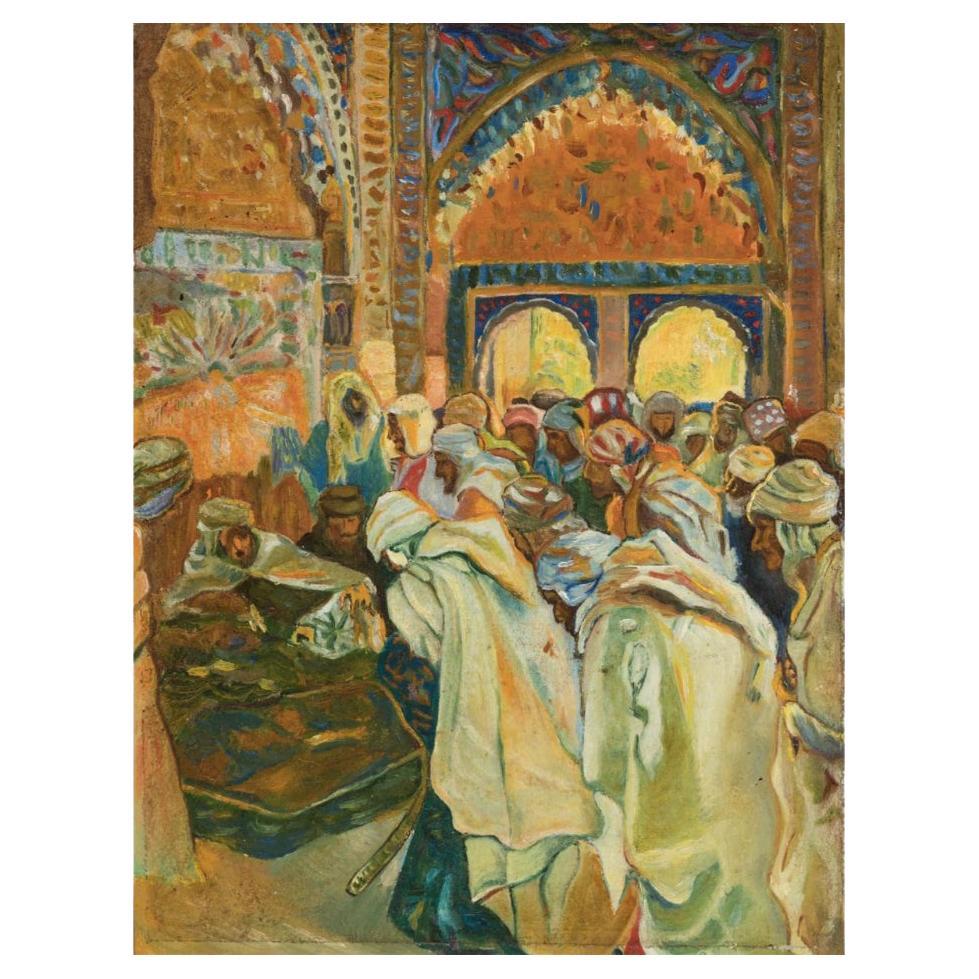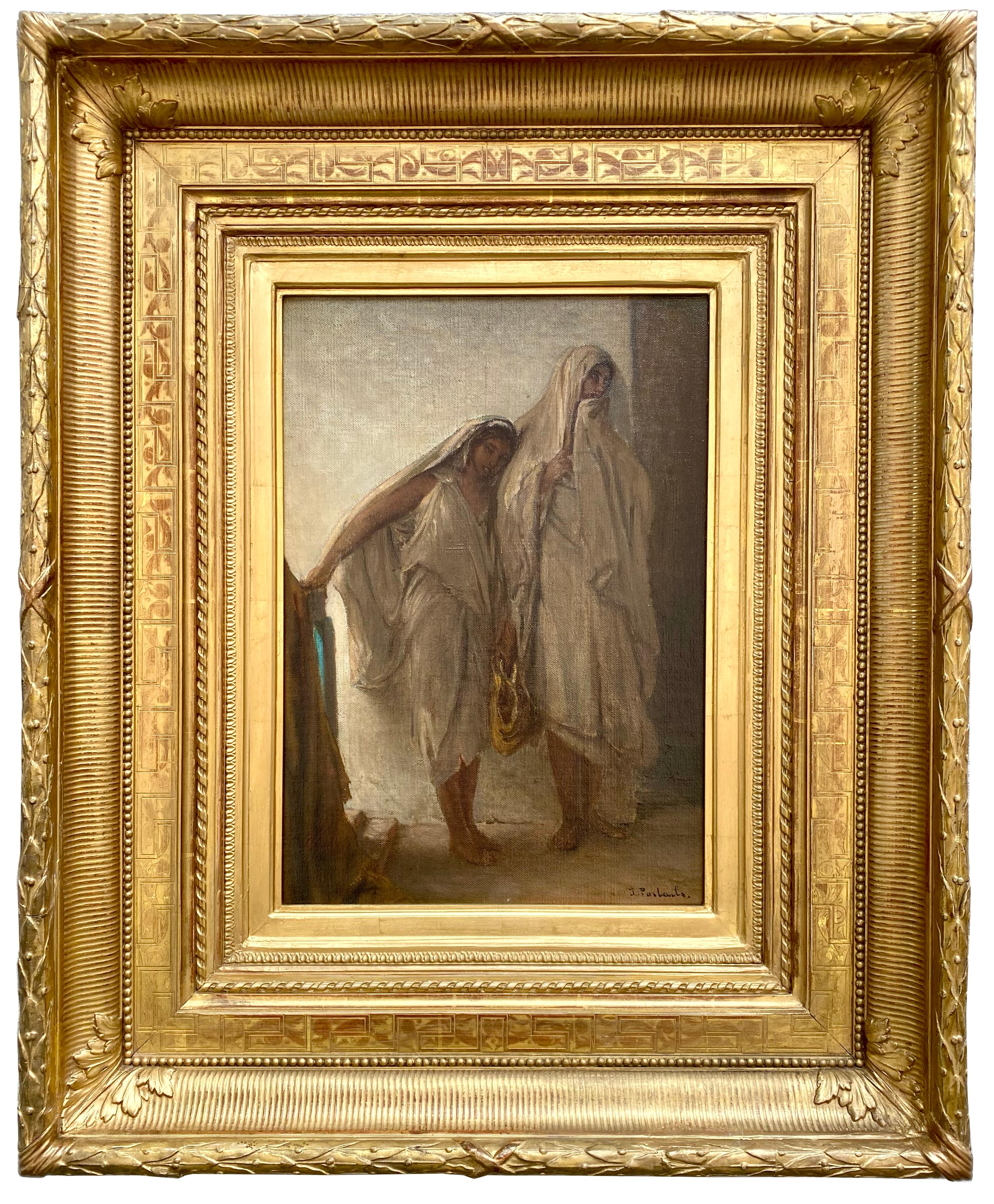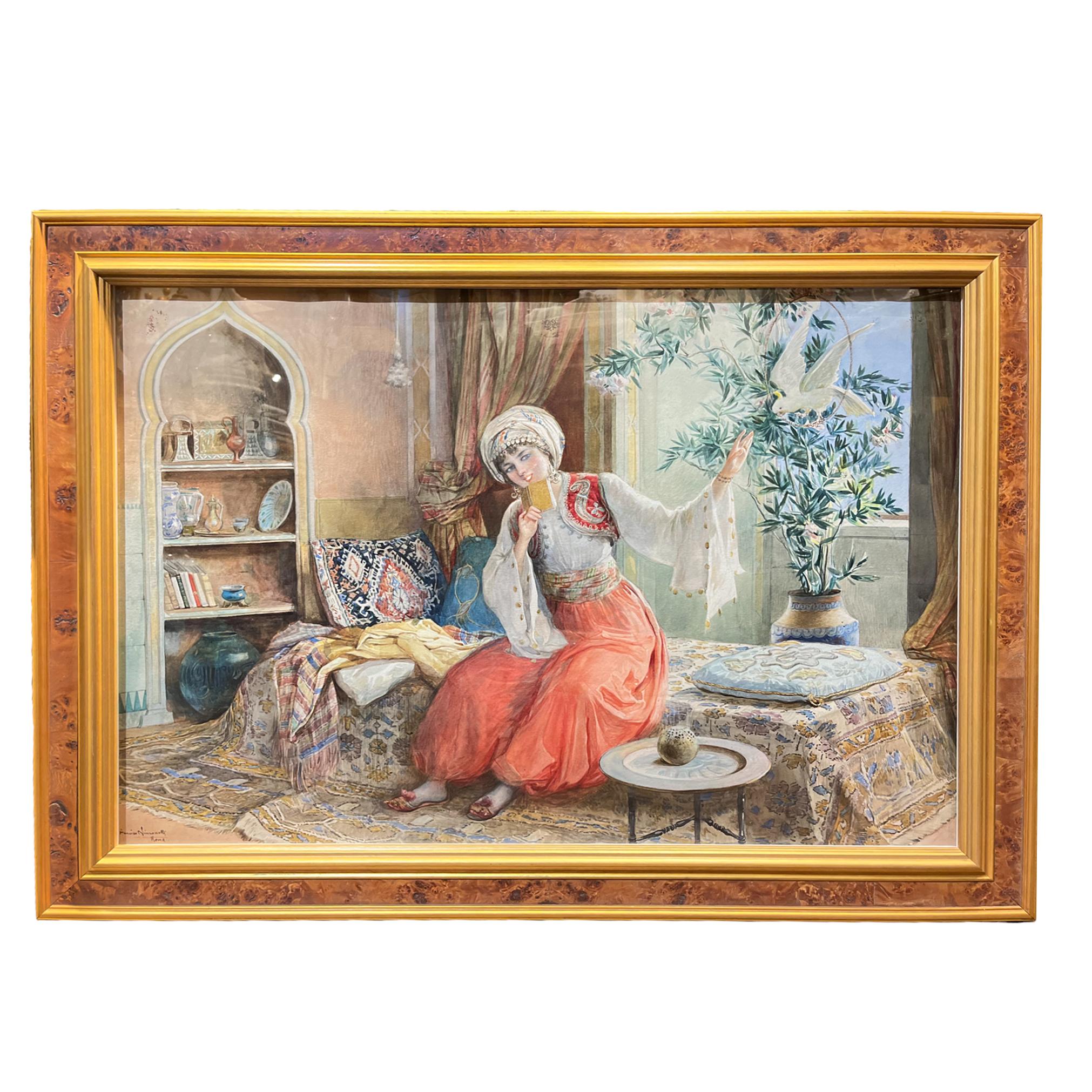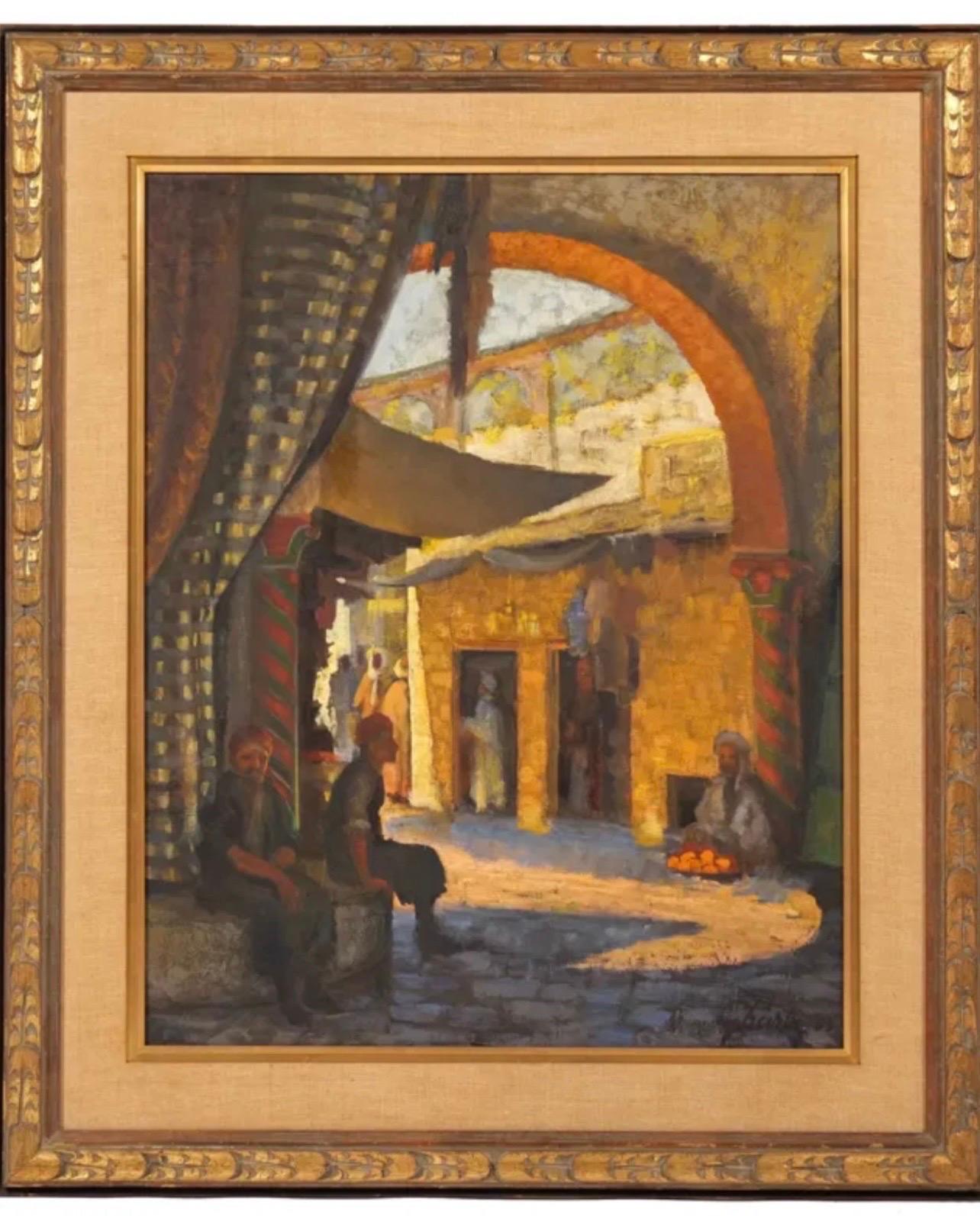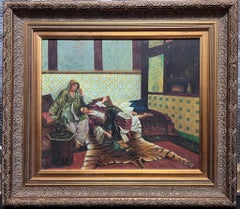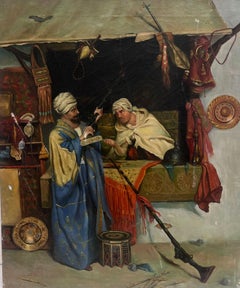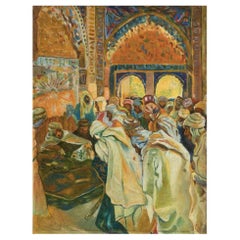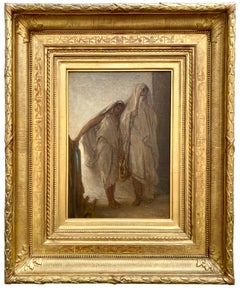Items Similar to VAN BIESBROECK Jules. Algerian women in an interior. Oil on panel. Signed.
Want more images or videos?
Request additional images or videos from the seller
1 of 3
Jules Pierre van BiesbroeckVAN BIESBROECK Jules. Algerian women in an interior. Oil on panel. Signed.
$20,471.17
£15,146.10
€17,000
CA$28,305.03
A$31,075.40
CHF 16,212.10
MX$376,055.55
NOK 203,193.51
SEK 191,461.71
DKK 129,438.48
About the Item
Algerian women in an interior. Oil on panel. Signed.
This work will be recorded in the catalogue raisonné of the work of the artist currently in preparation.
Jules Van Biesbroeck was the son of Jules Evariste van Biesbroeck, a painter of Ghent, but was born in Italy, in Portici, near Naples, while his parents were staying there. (In the 19th century many artists made educational trips to Italy). It was a long visit: the child was two years old by the time the family returned to Ghent.[1]
After a short period of practice with his father, van Biesbroeck was enrolled in the Academy of Fine Arts in Ghent. His first painting, "The Shepherd" (French: Le pâtre), was sold at the Triennale in Ghent. In 1888, when he was only 15 years old, he made his debut at the "Salon des Champs-Elysées" in Paris with his monumental work "The Launch of the Argo" (French: Le lancement d'Argo). The very large canvas, 7.5 by 2.6 meters, caused quite a stir because of the nakedness of his figures. When van Biesbroeck was called to Paris, his youth amazed viewers; to everyone's surprise, he obtained a "special mention". However, in order to exhibit the picture publicly, the figures had to be covered with drapery.[1]
In 1895 he began to devote himself to sculpture and his talent was rewarded by various commissions, including a monument to François Laurent for a square in Ghent and another in honour of Jean Volders. In 1897 he came second in the Belgian "Prix de Rome" for sculpture after Henri Boncquet and in 1898 he came second in the section devoted to painting.
When German troops invaded Belgium during World War I, he fled Ghent and went to Bordighera in Italy where he continued to paint and sculpt. He also gave art lessons to foreign residents of the town. In Italy his painting “Deposition" is on display in the Church of the Immaculate Conception in Bordighera.
In 1926 he made a trip to North Africa, where he was charmed by Algeria. The light and atmosphere of Maghreb pushed him to use lighter colours and engage with oriental subjects. Algiers had such an influence on him that he lived there for nine years until 1938. His studio, called "La Volière”, became extremely well-known throughout the city.[
In 1938 he returned to Ghent where he remained till his death in 1965.
About the Seller
5.0
Vetted Professional Seller
Every seller passes strict standards for authenticity and reliability
Established in 2015
1stDibs seller since 2019
36 sales on 1stDibs
- ShippingRetrieving quote...Shipping from: BRUSSELS, Belgium
- Return Policy
Authenticity Guarantee
In the unlikely event there’s an issue with an item’s authenticity, contact us within 1 year for a full refund. DetailsMoney-Back Guarantee
If your item is not as described, is damaged in transit, or does not arrive, contact us within 7 days for a full refund. Details24-Hour Cancellation
You have a 24-hour grace period in which to reconsider your purchase, with no questions asked.Vetted Professional Sellers
Our world-class sellers must adhere to strict standards for service and quality, maintaining the integrity of our listings.Price-Match Guarantee
If you find that a seller listed the same item for a lower price elsewhere, we’ll match it.Trusted Global Delivery
Our best-in-class carrier network provides specialized shipping options worldwide, including custom delivery.More From This Seller
View AllVAN BIESBROECK Jules. Arab women working. Pastel on grey paper.
By Jules Pierre van Biesbroeck
Located in Paris, FR
Arab women working.
Black and white pastel on thick grey paper.
Monogrammed.
Provenance : granddaughter of the artist.
This work will be recorded in the catalogue raisonné of the work of the artist currently in preparation.
Jules Van Biesbroeck...
Category
1930s Mixed Media
Materials
Pastel
Family scene. Oil sketch on cardboard.
By Jules Pierre van Biesbroeck
Located in Paris, FR
Family scene. Oil sketch on cardboard.
This work will be recorded in the catalogue raisonné of the work of the artist currently in preparation.
Jules Van Biesbroeck was the son of Jules Evariste van Biesbroeck, a painter of Ghent, but was born in Italy, in Portici, near Naples, while his parents were staying there. (In the 19th century many artists made educational trips to Italy). It was a long visit: the child was two years old by the time the family returned to Ghent.[1]
After a short period of practice with his father, van Biesbroeck was enrolled in the Academy of Fine Arts in Ghent. His first painting, "The Shepherd" (French: Le pâtre), was sold at the Triennale in Ghent. In 1888, when he was only 15 years old, he made his debut at the "Salon des Champs-Elysées" in Paris with his monumental work "The Launch of the Argo" (French: Le lancement...
Category
1930s Post-Impressionist Figurative Paintings
Materials
Oil
VAN BIESBROECK Jules. Snake charmer. Oil on panel. Signed.
By Jules Pierre van Biesbroeck
Located in Paris, FR
Algerian women in an interior. Oil on panel. Signed.
This work will be recorded in the catalogue raisonné of the work of the artist currently in preparation.
Jules Van Biesbroeck...
Category
1920s Figurative Paintings
Materials
Oil
An auction at Drouot's in Paris.
By René Francois Xavier Prinet
Located in Paris, FR
An auction at Drouot's in Paris.
Oil on canvas. Signed lower right.
Around 1900-1910.
René François Xavier Prinet (31 December 1861, Vitry-le-François – 26 January 1946, Bourbonne-les-Bains) was a French painter and illustrator who drew his subjects from middle-class society.
He was born to Henri Prinet, an Imperial Prosecutor in Vitry-le-François. A promotion led to him being posted in Paris, where they lived in a home not far from the École Nationale Supérieure des Beaux-Arts. His father painted as a hobby and was supportive of his desire to study art, having him seek the advice of Louis Charles Timbal [fr], a well-known church painter and friend of the family.
Around 1880, he began his studies in earnest, in the studios of Jean-Léon Gérôme; remaining with him until 1885. That year, his painting "The Infant Jesus" was accepted for display at the Salon. This was followed by studies at the Académie Julian. At this time, he also became associated with a group of young artists known as the Bande Noire (Black Stripe), which included Lucien Simon, André Dauchez...
Category
Early 1900s Realist Figurative Paintings
Materials
Oil
'Hamam Rigba'. Oil sketch on cardboard. Signed and titled on back.
By Jules Pierre van Biesbroeck
Located in Paris, FR
'Hamam Rigba'. Oil sketch on cardboard. Signed and titled on the back.
This work will be recorded in the catalogue raisonné of the work of the artist currently in preparation.
Jules...
Category
1930s Post-Impressionist Landscape Drawings and Watercolors
Materials
Oil
Portrait of the grand daughter of the artist. Oil on panel. Signed.
By Jules Pierre van Biesbroeck
Located in Paris, FR
Portrait study of the grand daughter of the artist. Oil on panel. Signed. Unframed.
This work will be recorded in the catalogue raisonné of the...
Category
1940s Portrait Paintings
Materials
Oil
You May Also Like
French North African Orientalist Oil Painting Hareem Interior Two Ladies
Located in Cirencester, Gloucestershire
The Hareem Interior
French Orientalist School, late 20th century
(painted after an earlier style)
oil on canvas, framed
framed: 30 x 34 inches
canvas: 20 x 24 inches
provenance: priv...
Category
20th Century Modern Figurative Paintings
Materials
Oil, Canvas
Orientalist North African Figures Market Stall City Scene large Oil Painting
Located in Cirencester, Gloucestershire
Market Stall Conversation
French School, 20th century
oil on canvas, unframed
canvas : 24 x 20 inches
provenance: private collection, France
condition: sound condition but with consi...
Category
Mid-20th Century French School Figurative Paintings
Materials
Oil, Canvas
$1,362 Sale Price
20% Off
20th Century, Spanish Painting Orientalist School "Audience at the Alhambra"
Located in Marbella, ES
Spanish Orientalist school, 20th century.
"Audience in the Alhambra".
Oil on canvas.
Measurements: 31,5 x 23 cm; 47 x 39 x 39 x cm (frame).
Orientalism was born in the 19th centu...
Category
Early 20th Century Spanish Paintings
Materials
Canvas
‘Oriental Girls - Mediants à Tanger’, Jean François Portaels ( 1818 - 1895 )
Located in Knokke, BE
Jean François Portaels
1818 - Brussels - 1895
Belgian Painter
‘Oriental Girls - Mediants à Tanger, Maroc’
Signature: signed lower right ‘J. Portaels’
Medium: oil on canvas
Dimensions: image size 40,5 x 28,5 cm, frame size 67,5 x 56 cm
Biography: Jean François Portaels, also known as Jan Portaels, was a versatile Belgian painter born on April 3, 1818, in Vilvoorde and passed away on February 8, 1895, in Schaerbeek. He was celebrated for his genre scenes, biblical stories, landscapes, portraits, and Orientalist subjects. As a teacher and director of the Academy of Fine Arts of Ghent and the Académie Royale des Beaux-Arts in Brussels, Portaels significantly impacted Belgian art, becoming a pivotal figure in the Belgian Orientalist school. His works were known for their 'everyday elegance and feminine grace,' and he played a crucial role in influencing the next generation of Belgian artists, including notable figures like Théo van Rysselberghe.
Portaels was the son of a wealthy brewer who also served as Vilvoorde's mayor. Showing an early passion for drawing, he was sent to the Académie Royale des Beaux-Arts in Brussels in 1836, where he studied under François-Joseph Navez, a former student of Jacques-Louis David. Navez invited him to his studio, which was renowned at the time, allowing Portaels to refine his skills alongside other talented students like Charles de Groux and Joseph Stallaert.
In 1841, Portaels moved to Paris, enrolling at the Ecole des Beaux-Arts and studying under Paul Delaroche. He became influenced by the emerging Orientalist movement, which was gaining traction in Paris. In 1842, he won the Grand Prix de Rome, which funded his travels across Italy and other regions, including Morocco, Algeria, Egypt, Lebanon, Judea, Spain, Hungary, and Norway. These journeys profoundly influenced his artistic vision, particularly his Orientalist works.
Upon his return to Belgium in 1847, Portaels was appointed Director of the academy in Ghent. In 1849, he married Marie Hélène Navez, the daughter of his first teacher. Despite being offered the directorship of the Brussels Academy, he initially declined, opting to preserve his independence. He later accepted a teaching position at the Academy and eventually became its director in 1878, succeeding Eugène Simonis.
Portaels was known for his broad range of artistic talents, including history painting, portraiture, and genre art. He was particularly recognised for his Orientalist depictions, often portraying the 'Oriental woman' with distinctive features like arched eyebrows and almond-shaped eyes. His style, marked by charm and elegance, distinguished him from the dominant artistic movements of Classicism and Romanticism.
He was a pioneer in monumental art in Belgium, working with Jean Baptiste van Eycken to introduce fresco techniques like water glass painting...
Category
Mid-19th Century Impressionist Portrait Paintings
Materials
Canvas, Oil
Watercolor of Orientalist Indoor Scene by Amedeo Simonetti
Located in New York, NY
Title: Middle Eastern Indoor Scene
Artist: Amedeo Simonetti (1874 - 1922)
Origin: Italian
Date: 19th Century
Medium: Watercolor
Signature: Signed ‘Amedeo...
Category
19th Century Interior Paintings
Materials
Bronze
Large Orientalist Arab Oil Painting Merchants at the Bazaar Souq Jalal Gharbi
Located in Surfside, FL
Merchants at the Bazaar Oil Painting by Jalal Gharbi (1920-2005)
Frame: 40 X 34
Image: 29.75 X 23.75
Provenance:The Estate of Isobel Riddoch Gharbi, Manhattan, NY
Jalal Gharbi (1920-2005) who was a prolific North African, Tunisian, French painter of both Middle Eastern Arabic...
Category
1960s Post-Impressionist Landscape Paintings
Materials
Canvas, Oil
More Ways To Browse
Immaculate Conception
Pierre Signed Oil Painting
Algeria Painting
Ghent Painting
Jules Pierre Van Biesbroeck
Van Biesbroeck Jules
French Painting Boulevard
Giulio Rosati
Glatz Oszkar
Graydon Parrish
Greek Mythology Oil Painting
Haitian Voodoo
Ingrid Smuling
Jack Hooper
Jon Demartin
Josep Serrasanta
Juan Soler
Kostabi On Canvas
